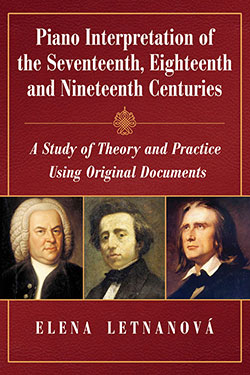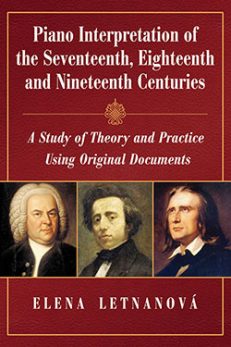Piano Interpretation of the Seventeenth, Eighteenth and Nineteenth Centuries
A Study of Theory and Practice Using Original Documents
$29.95
In stock
About the Book
How should one interpret music of another century? What standards should be applied to an 18th century harpsichord work, for instance, being performed on a piano? Keyboard “methods”—systematic approaches to training, touch, and interpretation—did not evolve until the 19th century, and written methodologies are few. Drawing on primary sources, the author has compiled a detailed analysis of such keyboard “methods” as existed in Europe in the 17th, 18th, and 19th centuries. Most were developed by Couperin, C.P.E. Bach, Türk, J.S. Bach, Mozart, Chopin and Liszt. Also discussed, with translations from their writings and their critics’, are the detailed theoretical works by Kullak and Lussy. Analysis shows which techniques had been adapted from earlier practice and which were original to the composer, demonstrating the evolution of the various methods. Techniques useful in the interpretation of period material, and which still have important applications today, are pointed out.
About the Author(s)
Bibliographic Details
Elena Letnanová
Format: softcover (6 x 9)
Pages: 196
Bibliographic Info: musical notation and lyrics, appendix, notes, bibliography, index
Copyright Date: 2012 [1991]
pISBN: 978-0-7864-6708-2
Imprint: McFarland
Table of Contents
Introduction ix
1. Predecessors of the Piano 1
2. French Methods of the Seventeenth and Eighteenth Centuries 5
Francois Couperin: L’Art de toucher le clavecin 7
3. German Treatises of the Eighteenth Century 37
Carl Phillip Emmanuel Bach: Versuch uber die wahre Art das Klauier zu spielen 38
Daniel Gottlob Turk: Klavierschule oder Anweisung zum Klavierspielen fur Lehrer und Lehrnende 66
4. Johann Sebastian Bach and Wolfgang Amadeus Mozart 87
5. Frederic Chopin and Franz Liszt 101
6. German and French Treatises of the Nineteenth Century 141
Adolph Kullak: Die Aesthetik des Klavierspiels 141
Mathis Lussy: Traite de l’expression musicale 153
Appendix: The Development of the Elements 171
Notes 173
Bibliography 179
Index 181
Book Reviews & Awards
“discusses chronologically various treatises and schools”—Choice.





